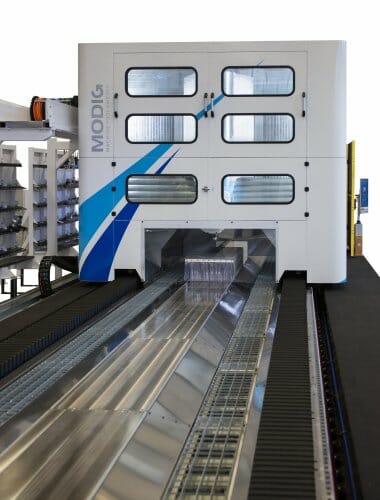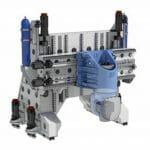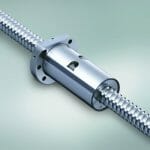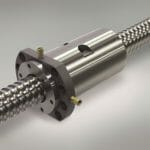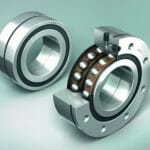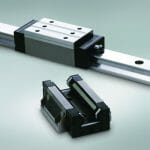
The RigiMill high-speed machining centre from Swedish manufacturer Modig holds the world record for high-speed milling. During an in-house exhibition, the machine removed 1001 cubic inches of chips or 16.4 litres of solid material in one minute. The Y and Z axes of the RigiMill feature twin drives with cooled HMD ball screws from NSK. Axial bearings and roller guide-ways for the axes are also supplied by NSK.For machining centres in the aircraft and aerospace industries, chip removal speed is a key parameter because many of the central, very large components like wing ribs and other structural parts are milled from solid material. For example, parts weighing over 100 kg could be made from blocks of aluminium weighing 4 tonnes or more, which means that 97.5% of the material has to be removed.
Customers want maximum machining speed
Modig Machine Tool AB in Virserum, Sweden is well placed in the demanding field of high-speed machining for materials such as aluminium, titanium, steel and composites. The company, which was founded in 1947 by the grandfather of the current owner and CEO David Modig, develops and manufactures very high performance CNC machines that are used by aerospace manufacturers all over the world, including Airbus, Boeing, SAAB, Sikorsky and Volvo Aero. And while all Modig machines are reputed for their high speed and precision, the RigiMill gantry machine sets new standards in this regard.
“One of our goals was to develop the first 2-in-1 machine in this performance class; in other words a milling machine for high-speed roughing and finishing,” explains David Modig. “And the second goal: the RigiMill had to be the fastest milling machine in the world.”
- NSK ball screws with nut cooling are used in the Y and Z axes. Photo: Modig Machine Tool
- The HMD series was developed for high-speed machining applications. Photo: NSK
- Nut cooling removes the heat precisely at the point where it is generated, maintaining maximum precision at high speeds. Photo: NSK
- Double-row axial angular contact ball bearings are used as the ball screw support bearings. Photo: NSK
- RA linear guides ensure high accuracy in all main axes. Photo: NSK
Stiffness as a requirement for accuracy
This goal was not an end in itself and the purpose was not to get an Olympic medal. David Modig says: “The aircraft industry is booming and manufacturers are continuously expanding their capacity, so we wanted to supply our customers with gantry systems that have even shorter machining cycles.” Machining the structural components of an aircraft also requires precision at the highest level, so the stiffness of the machine axes is just as important as speed, or even more so. The spindle of the RigiMill therefore uses twin drives on the Y and Z axes with a positioning accuracy of 0.5 μm in each case. The two electric motors work in master/slave mode.
“We only work with the best suppliers”
When selecting the linear drives for the axes, the decision was based not only on the technical specifications of the drive units, as David Modig explains: “We only work with the best suppliers. In this case we looked for a reputable supplier who had drive units with the highest accuracy, and the passion to support and promote innovative developments.”
With these criteria in mind, the choice was made in favour of NSK. And it was no surprise, because all previous models of Modig machining centres have been equipped with NSK drive components. In co-operation with Swedish authorised distributor Acumo, specialists from NSK in Ratingen configured the drive units, taking into account factors such as torque, speed, axis acceleration forces and the temperatures generated in the spindle drives during high-speed machining.
Ball screws for high-speed machining
Under these conditions, HMD series ball screws with nut cooling were found to be the optimal solution. The HMD series has been designed exclusively for use in high-speed machining applications, supporting travel speeds of up to 120 m/min. With a newly developed recirculation system, it was possible to increase the d x n speed rating to 160,000.
Nut cooling increases precision
Cooling the linear drive through the nut (precisely where the heat is generated), guards against temperature increases which could potentially impair the accuracy of machining.
To develop this linear drive with optimised cooling, NSK had to overcome a number of design challenges. For instance, the company’s specialists had to solve a problem caused by the cooling, which made the material in the body of the nut contract and affect the preload of the ball screw. After extensive tests, NSK development engineers came up with a cooling system whereby the preload level was not affected by the cooling at any time during operation.
From a single source: ball screws, bearings and roller guide-ways
Ball screws with nut cooling from the HMD series are used in the RigiMill’s Y and Z axes. The Y axis has a travel distance of 1560 mm, with 900 mm in the Z axis.
HMD ball screws are equipped with axial angular contact ball bearings from NSK’s BSBD series that were developed precisely for this type of application. The double-row configuration of these bearings, with a contact angle of 60°, is capable of withstanding high axial loads in both directions. They simultaneously offer the stiffness and accuracy required for modern precision machinery.
The NSK system solution is completed by RA roller guides in all the main axes of the RigiMill. They too, are characterised by extreme stiffness at maximum load capacity and create the conditions for the spindle axes to run smoothly, with low vibration in spite of the high speeds and high forces generated by machining. The ideal line contact of the roller keeps the displacement force low because a pure rolling movement adds no friction to the drive.
An impressive overall solution
“The components from NSK and the whole drive system meet the highly stringent requirements that we demand from our suppliers,” states David Modig. “They make a significant contribution to ensuring that the RigiMill not only works with the highest precision but also at extremely high speed, which in turn lowers machining times and cost per part.”
The RigiMill thus represents an economic solution from the customer’s point of view, simply because it can produce more structural aerospace parts in a given time. Take the example of a wing rib, where the machining time of 384 minutes is reduced to only 74 minutes. In addition, when performing finishing, the machine can produce a surface quality of up to 0.8 Ra. Reactions from the company’s customers in the aircraft industry are equally positive.
David Modig says: “We’ve never had such good feedback from the launch of a new product series. Almost immediately, the RigiMill has found its place in the investment plans of major aircraft manufacturers and their suppliers.”
The world record that was set during a customer demonstration in October 2017 was surely a contributing factor. RigiMill removed 16.4 litres of solid material in just one minute. The spindle was running at speeds of up to 30,000 rpm driven by a 180 kW motor. After this impressive record was set, the first orders quickly arrived, which has led Modig to increase its manufacturing capacity in line with major aircraft manufacturers. A new production building is currently under construction.

